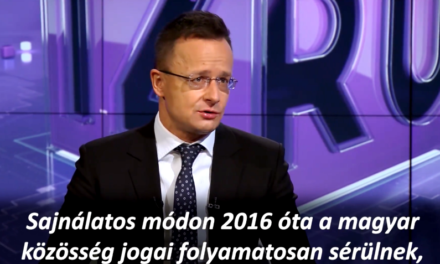At yesterday's plenary session of the EP, the Greek Margarítisz Szkínász explained that the ancestors of European citizens were immigrants, and the workers in EU institutions are all migrants. For sure, he must have meant the migration of people, because this train of thought cannot be interpreted in any other way. Also, only as demagoguery, which is a word of Greek origin, so Skínás should be aware of this.
But he only taught his lesson, that migration can be a success story, it just needs to operate within a regulated framework and be mutually fruitful for the sending and receiving countries. Well, yes - we can add - but this has not yet been achieved in any country.
On the contrary, all over Western Europe are just now beginning to see
where the admission of the migrant masses has led.
Szkínász said that the committee supports legal migration aimed at improving the labor situation, for example, because only 25 percent of highly skilled immigrants choose the EU to work, which makes the global competition for talent more intense for the Union.
there is a high labor shortage in sectors requiring low or medium qualifications
He stated that by the end of the year, the European Commission will submit proposals on what skills Europe needs, and would also develop channels for talent recruitment at the international level.
Balázs Hidvéghi, the Fidesz EP representative, responded to these, and in his speech he emphasized that the basic statements and suggestions of the report related to the debate are also flawed. "We must dispel the myth that mass migration is the answer to demographic challenges or labor market problems," he said.
According to the representative, left-wing and liberal factions are forcing multiculturalism throughout Europe. According to the representative, mass migration fundamentally changes the composition and cultural character of a society.
"You can see what kind of problems the influx, which was originally aimed at employment, but became massive, caused in Western Europe. The large, rich member states are also unable to cope with the social, cultural and public security challenges arising from mass migration. The assumption that multiculturalism is necessarily better than a homogeneous European society is wrong," the representative pointed out.
He added: there is no need for European-level migration rules for the purpose of employment, each member state must decide for itself on this issue.
"If a country is struggling with demographic challenges or labor market problems, there are many tools at its disposal. It is enough to look at Hungary's successful family policy and tax policy, with which we set a good example for Europe," said the MEP representative.
"Due to the coronavirus epidemic, unemployment has increased across Europe. It is unacceptable that instead of helping European people to work, the pro-immigration left wants to bring migrants to Europe. The people of Europe must be given jobs again, and Europe must not be flooded with unskilled labor," concluded the representative.
Source: Karpatalja.ma












